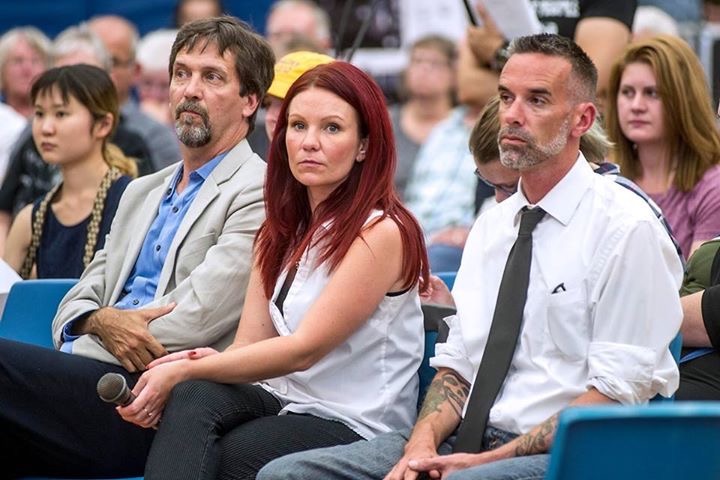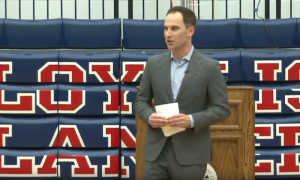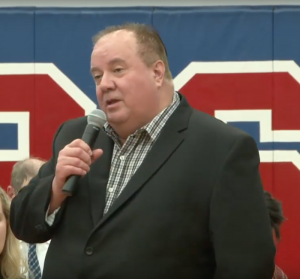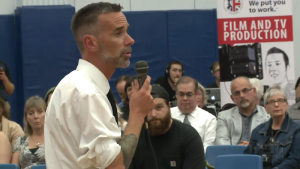Forum hears local news matters while newsrooms struggle to keep up

A crowd gathered Monday night at Loyalist College to speak about the issues affecting local journalism in the Belleville area. A panel of local Journalists were at the news forum to field questions from the community . From left to right Bill Glisky, Nicole Kleinsteuber, and Brice McVicar. – Photo by Michael J Brethour Photography
By Bradley Bennett, Lindsey Cooke, Joseph Carin
BELLEVILLE – Local news matters, but a lack of resources in newsrooms within Quinte poses a huge obstacle in trying to cover everything going on in the community.

Moderator for the night CTV news anchor & Loyalist graduate, Tony Grace made sure the night was kept under control and the theme of local news was stuck to.
Those were the two most common themes discussed at a local news forum hosted by CTV anchor Tony Grace held Monday night at Loyalist College. Newsroom managers, journalists, politicians, community leaders, and prominent figures were invited to discuss why news in the region matters.
Grace told the crowd of more than 100 people the three main areas to cover during the 90-minute live event were why local news matters, the current state of the news environment, and what can be done to improve journalism.
“Fundamentally local journalism matters because people who live in communities need to make decisions and to be informed, ” InQuinte managing editor Bill Glisky said.

Managing editor of inQuinte.ca Bill Glisky addressing a question at the local news forum at Loyalist college
From the outset the opinions of the community were mixed about the possible outcomes.
“I hate to say it but probably nothing at all,” said Elizabeth Grew.
Steve Steinbeck, another participant said he wanted to embarrass the media representatives.
Others were more positive.
Belleville Mayor Christopher Taso supported local journalism. said “I think [our local journalism is] good, but it could get better. This forum is the type of communication we need to take it to the next level.”
“I think [our local journalism is] good, but it could get better. This forum is the type of communication we need to take it to the next level,” he said.
As the night unfolded, many participants wanted to know why certain events or issues were not covered.
Christine Durant, the director of from the Poverty Roundtable in Hastings County raised a number of question.
There is a need to look at who is getting left out and who is missing from the stories, she said.
“The Canadian census came out last week about the income levels and what is a low-income level and we know the low income levels for Belleville it has increased significantly, with the exception of Quinte, but that was not reported on.” she said
Indigenous people also feel misunderstood by local media.
“Never once have I read an article about how much the land and resources benefitted corporations or the Canadian public who benefitted from the economics stimulated over many decades while First National languished in poverty and neglect,” said Chief Donald Maracle, of the Mohawks of the Bay of Quinte.

Tyendinaga Mohawk Territory Chief Donald Maracle talking to the crowd at Loyalist College about the underrepresented stories in the Indigenous community.
“Young Indigenous people say they’re tired of reading so many negative stories of the First Nations people, and the effect that journalism has on them when they go to high school. It often perpetuates racism and makes it harder in their schooling environments for them to function,” he said.
Out of all the examples he gave Chief Maracle softy said,”there’s a story there.”
Newsroom managers said they face their own challenges.
“When I started we had around 12 reporters on the staff, and now on a good day we can have around three journalists out on the street,” said Brice McVicar, the managing editor of the Belleville Intelligencer.

Monday night at Loyalist College Managing Editor of the Belleville Intelligencer Brice McVicar speaks to a captivated crowd about the struggles and importance of local journalism
“There are ways around the problem of understaffing like staggering start times and proper scheduling on slow news days. We have to rely more on the community to provide well-written press releases with [supporting information for better coverage],” he said.
“It boils down to making that call,” said McVicar. “You [may] decide you’re gonna run with A when maybe you should have run with B, it is the same in any industry, I wouldn’t call them mistakes but errors in judgment, we are all human.”
Negative stories were a huge concern raised throughout the night.
“If you listen to talk radio in this town nobody would move here. We’re going to hell in a handbasket and I do not believe that. I think it is a responsibility of all media to tell stories and tell the truth, but not to look for all the negativity in everything,” said retired journalist Barry Robinson.
“That’s not all we write, that’s what people read and it’s a battle,” Gliskly responded. He pointed out that he had to read through 33 of the top read stories on inQuinte to see something that wasn’t bad news.
He pointed out that he had to read through 33 of the top read stories on inQuinte to see something that wasn’t bad news.
“We are fascinated by bad news..” but it is a grind to make people read the good news because if it “bleeds it leads” he said.
This was an opinion that was shared by local crown attorney Lee Burgess. was that “It is hard for local journalists to compete for readers within the community with national, international news [providers] and as well as social media [acting as competition for readers,]”
“It is hard for local journalists to compete for readers within the community with national, international news [providers] and as well as social media [acting as competition for readers],” he said.
Some of this competition comes out of large urban centres like Toronto.
“I think we have to be fair and honour our local news by going to it first instead of looking at a tweet that comes out of Toronto telling us what is happening in our community,” added Canadian Mental Health Association executive director, Sandie Sidsworth.

Nicole Kleinsteuber a radio news anchor and multimedia journalist from Quinte Broadcasting
Despite the rise of “fake news and clickbait, in the grand scheme of things, they are playing into the hands of local newsrooms. The size and scope of social media news is actually driving people closer to local news,” said County 99.3 FM news director Craig Foster.
In light of the negative points brought up during the forum, journalist Nicole Kleinsteuber said the possibility of social media creating a public sphere for the local populace to discuss community events and breaking news.
As the forum neared its end retired journalist Jerry Freyburg said “Everyone that is doing the job is passionate about the craft, it’s a calling if you will. Either that or we’re fools.”
Video by Loyalist College Film and Television program.
 Print This Post
Print This Post






